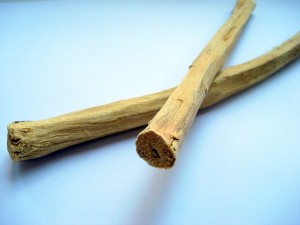Root are the most overlooked of the bunch, although there are a myriad of great treatments on the market. It is great in treating laundry list of ailments that include flu, body odor, asthma, hair loss, HIV, viral diseases, exhaustion, canker sores, bursitis, athlete’s foot, heartburn, yeast infections, gout, emphysema, fungal infections, ulcers, liver issues, dandruff, Lyme disease, and many, many others, besides. Listed below are 9 of the ailments that licorice root is used to treat.

Depression
One of the primary active ingredients of ginger root is as gland function promotes acid, that has proven effective in helping with nervousness and depression. These are the glands which are in control of the stress hormones such as cortisol. When hormones drop below their levels, symptoms like fatigue, anxiety, and depression can creep in, and the resistance to infections and allergens drops. The Asparagine acid found in ginger root is excellent at maintaining a perfect balance in the system.
Cardiovascular Disease Studies and High Cholesterol
Research has demonstrated that root can keep cholesterol ranges by enhancing the circulation of bile. Bile acids are pointed to by other research as being responsible for eliminating cholesterol. Licorice root has antioxidant properties which allow it stop build-up and the growth of plaque and to improve capillary health.
Menopause
Symptoms of menopause like exhaustion, mood swings, and hot flashes can be reduced as a result of the antioxidant and phytoestrogenic properties of root. Women who take just 1 root capsule daily find that their hormone balance is brought under control, thus restricting the symptoms of menopause.
Menstrual and PMS Cramps
The antispasmodic properties in root can assist with a number of PMS symptoms that are related, like cramps, nausea, bloating, tender breasts, and mood swings. Women should consume root in tea form to help decrease the symptoms of PMS, in the days leading up the beginning of the menstrual cycle.
Skin Issues
For several years, licorice root has been used to make poultices and salves used to treat skin complaints like itchy or dry skin, rashes, psoriasis, and eczema. A study conducted on ginger root revealed that the symptoms of eczema could decrease. Use the root to make a salve which can be applied two to three times per day.
Gastric and Abdomen Troubles
Intestinal and digestive problems can also be treated with root. The flavonoids are all effective in helping with inflammation of the digestive tract, lessening the distress from the process. Soothing agents might assist with digestive issues, and may also help promote wholesome bowel movements. The way of use is to drink two to three cups of root tea every day.
Herpes and Shingles
The sores caused by herpes simplex along with Shingles may be treated using ginger root extract. Research has revealed that the anti-viral properties in the extract helps stop the cold sores brought on by the herpes virus. The easiest form of treatment is to acquire the root extract in capsule form. The capsules should be taken twice. You use it to the affected are 4 to 5 times every day and might produce a salve.
Weight Reduction
Individuals who took part found their body fat decreased when taking 3 grams of licorice root daily for a period of 2 months. Nevertheless, frequently eating ginger root is not a practice that’s advised for everyone. While the licorice root was absorbed for a two month period it’s recommended that a 1 week break from the herb be obtained during this time period. Additional fat can be lost when committing to a balanced diet and exercise as well as carrying the ginger root.
Salivary Glands
Issues with the glands are not something that is treated with licorice root. While licorice is often added to sore throat remedies, there is. That said, many herbalists are on record as saying that the salivary glands can be helped with by root.
What Are the Side Effects of Licorice Root?
Licorice root taken over an elongated time period may lead to also the retention of fluid, hypertension, hypertension, and reduced potassium levels in the body. Individuals with heart problems are advised to not use this herb. You may encounter issues if you are allergic to foods at the Fabaceae family.
Root has estrogenic properties which can make it possibly problematic for pregnant ladies. Always speak to your doctor first before taking root, because he or she can let you know of any problems that might arise from taking it. You should not take licorice root, if you are on hormone or medication supplements.
